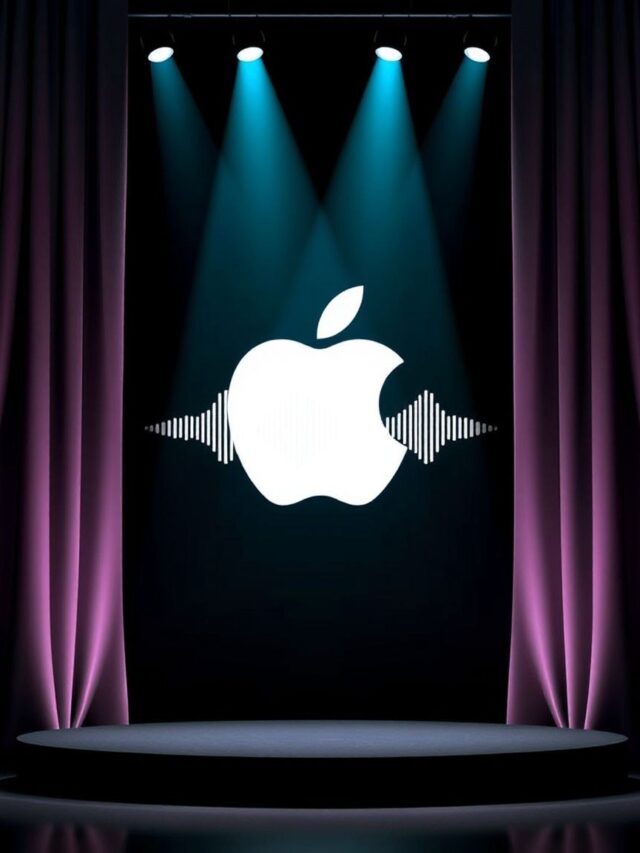apple ai voice cloning:-Apple’s New AI Feature ‘Creepily’ Replicates Your Voice — Even Dead Loved Ones
In a move that’s both fascinating and unsettling, Apple has unveiled a new AI feature that can clone your voice in just 15 minutes — sparking privacy debates and emotional reactions worldwide.
Apple’s WWDC 2025 brought with it a wave of AI innovations, but none caught the public’s attention quite like the Personal Voice update. Using advanced machine learning, this tool allows users to replicate their voice, which can then be used for voice assistance, calls, and even future AI interactions.
But as the excitement of technological progress sets in, so does unease — because this voice clone doesn’t just work while you’re alive. It can also replicate the voice of someone who has passed away, with just a few minutes of recorded data.

A Voice from the Past — Or a Glimpse of the Future?
During the demo, Apple showcased a simulated conversation where a user interacted with a Siri-like assistant using their deceased grandmother’s voice. The result? Emotionally powerful — and, for some, deeply disturbing.
“It was comforting… and a little creepy,” one WWDC attendee admitted. “Hearing a loved one’s voice again through AI made me tear up, but it also raised ethical questions I hadn’t considered before.”
How the Feature Works
The technology behind it is undeniably impressive:
- Just 15 minutes of voice data is enough to train the system.
- The AI uses on-device learning, meaning no voice data needs to leave your iPhone or iPad.
- It can replicate not just tone and pitch, but also emotions, breathing, and natural pauses.
Apple says the system is designed with privacy in mind, and voice models stay local unless the user permits sharing.
‘Creepy’ or Comforting? Social Media Reacts
Once the feature hit the spotlight, users across X (formerly Twitter), Reddit, and TikTok shared mixed feelings. Some praised the feature for its potential in helping people with speech impairments. Others, however, found it “creepy,” “Black Mirror-esque,” or emotionally manipulative.
One post went viral with over 2 million views:
“I just heard my dead father say ‘I’m proud of you’ using Apple’s AI… I don’t know how to feel.”
A New Era of Digital Grief Tech?
This isn’t the first time tech has intersected with grief. AI-powered chatbots trained on messages from deceased loved ones already exist (like “Replika” or “Project December”), but Apple’s entry into the space gives it mainstream momentum.
Experts warn that normalizing digital resurrection could have unintended psychological effects.
“There’s a thin line between healing and delaying grief,” said clinical psychologist Dr. Meera Shah. “Voice is deeply personal. Hearing it again, especially without consent from the deceased, might distort the mourning process.”
Who Can Benefit from It?
Apple says this feature is especially helpful for:
- People at risk of losing their voice due to ALS or medical conditions
- Users who prefer non-standard English accents
- Developers creating personalized AI assistants
Accessibility is a clear goal — but public feedback shows that emotional boundaries remain undefined.
Can It Be Misused?
Yes, and Apple knows it. The company says it will require user consent, device passcodes, and on-device processing to limit abuse.
Still, privacy advocates aren’t fully convinced.
“If someone can clone my voice and use it in a fake video or call, that’s a nightmare scenario,” said a digital rights activist. “And we’re not far from it.”
Legal Questions Still Unanswered
Voice cloning technology raises several questions:
- Who owns the voice data — you or Apple?
- Can it be used in court?
- What if a voice model is misused after someone dies?
As of now, there are no clear global laws addressing deepfake voices — especially posthumous ones. Apple’s privacy-focused branding helps, but legal gray areas remain.
Bottom Line: Awe and Anxiety Collide
Apple’s new voice cloning feature is a technical marvel, no doubt. But it also touches raw human emotions — love, loss, memory — in a way that few other tech innovations do.
As with all powerful tools, it comes down to how we use it. For some, it will be a lifeline; for others, a digital ghost they’re not ready to hear.
read this also:-
Google AI Told Me to Eat Glue? 😱 Search Overhaul Backfires!
AI Deepfake Scam Steals ₹200 Crore – Are YOU Next?
Elon Musk Drops Lawsuit Against OpenAI—But Says He’ll ‘Expose the Truth’ in New Tell-All”
Hi, I’m Santu Kanwasi, a passionate blogger with over 2 years of experience in content writing and blogging. I create original, informative, and engaging articles on a wide range of topics including news, trending updates, and more. Writing is not just my profession—it’s my passion. I personally research and write every article to ensure authenticity and value for my readers.
Whether you’re looking for fresh perspectives or reliable updates, my blog is your go-to source!





